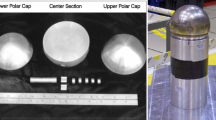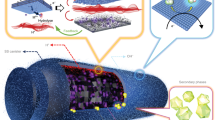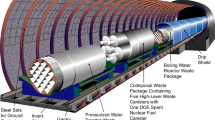Abstract
CERTAIN radioactive materials can be brought into the gas phase in a charged condition; for example, a large percentage of the products formed after the decay of the emanations and also some recoil atoms. It was thought that these ions might be suitable particles for tracing electrical or magnetic fields, especially inherent electric fields due to contact potential differences and fields of very small dimensions (where conventional test bodies would disturb the field).
This is a preview of subscription content, access via your institution
Access options
Subscribe to this journal
Receive 51 print issues and online access
$199.00 per year
only $3.90 per issue
Buy this article
- Purchase on Springer Link
- Instant access to full article PDF
Prices may be subject to local taxes which are calculated during checkout
Similar content being viewed by others
References
See, for example, de Boer, J. H., “Elektronenemission und Adsorptionserscheinungen”, 20 (Leipzig, 1937).
Erwall, L.-G., and Hillert, M., Research, 4, 242 (1951).
Jech, C., Nature, 161, 314 (1948).
Author information
Authors and Affiliations
Rights and permissions
About this article
Cite this article
WESTERMARK, T., ERWALL, LG. Study of the Distribution of Surface Potential by means of Radioactive Deposits. Nature 169, 703–704 (1952). https://doi.org/10.1038/169703a0
Issue Date:
DOI: https://doi.org/10.1038/169703a0
This article is cited by
-
Potential distribution on the surface of alkali coated metals
Die Naturwissenschaften (1959)
-
Autoradiography of Metal Surfaces using a Radiochemical Method
Nature (1952)
Comments
By submitting a comment you agree to abide by our Terms and Community Guidelines. If you find something abusive or that does not comply with our terms or guidelines please flag it as inappropriate.



